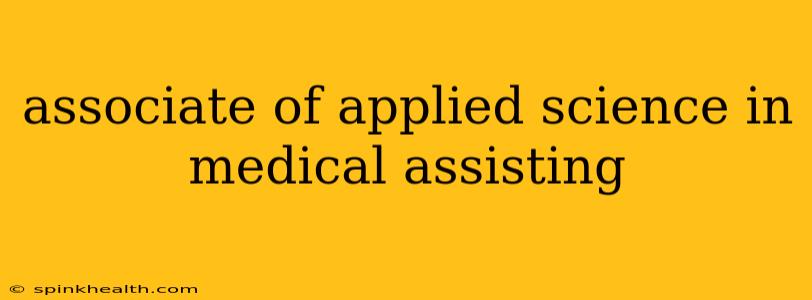The world of healthcare is constantly evolving, offering diverse and rewarding career paths. For those with a passion for medicine and a desire for hands-on patient interaction, the Associate of Applied Science in Medical Assisting (AAS in MA) stands out as an excellent choice. This program provides a comprehensive education, equipping graduates with the essential skills and knowledge to excel in a dynamic medical setting. But what exactly does this degree entail? And is it the right path for you? Let's delve into the details.
What is an Associate of Applied Science in Medical Assisting?
Imagine a career where you're at the heart of patient care, bridging the gap between patients and physicians. That's the essence of a Medical Assistant's role. An AAS in Medical Assisting is a two-year associate's degree program designed to train students to become skilled and competent medical assistants. The curriculum covers a wide range of subjects, from clinical skills like taking vital signs and administering injections, to administrative tasks such as scheduling appointments and managing medical records. It's a blend of theory and hands-on practice, preparing graduates for immediate entry into the workforce.
What are the core competencies of an AAS in Medical Assisting program?
Many programs focus on a few key areas, with some variation:
- Clinical Skills: This includes proficiency in taking vital signs (blood pressure, temperature, pulse, respiration), performing electrocardiograms (ECGs), administering injections, drawing blood, and assisting with minor procedures. You'll learn sterile techniques and proper infection control practices.
- Administrative Duties: Medical assistants play a vital administrative role, including scheduling appointments, managing patient records (both electronic and paper), handling insurance claims, billing, and maintaining patient confidentiality (HIPAA compliance is paramount).
- Medical Terminology and Anatomy & Physiology: A solid understanding of medical terminology, anatomy, and physiology is crucial for effective communication and patient care.
- Phlebotomy: This is often a core component, training students in the proper techniques for drawing blood samples.
- Electronic Health Records (EHR) Software: Familiarity with EHR software is essential, as most medical offices utilize electronic record-keeping systems.
What are the career prospects after completing an AAS in Medical Assisting?
Graduates with an AAS in MA are highly sought after in a variety of healthcare settings. The demand for skilled medical assistants is consistently strong, offering numerous career opportunities. Some common career paths include:
- Physician's Offices: Assisting physicians in various medical specialties.
- Clinics: Working in multi-specialty clinics, providing support to multiple physicians.
- Hospitals: Assisting in hospital settings, including inpatient and outpatient departments.
- Urgent Care Centers: Providing immediate medical care to patients.
- Nursing Homes and Assisted Living Facilities: Offering support to elderly and chronically ill patients.
Is an AAS in Medical Assisting right for me?
This is a question only you can answer, but consider these points:
- Do you enjoy working with people? Medical assisting involves direct patient interaction, so strong interpersonal skills are vital.
- Are you detail-oriented and organized? Administrative tasks require precision and attention to detail.
- Are you comfortable with medical procedures? Clinical skills require a willingness to perform tasks that might involve needles or other medical instruments.
- Are you interested in a fast-paced environment? Medical offices can be busy places, requiring adaptability and the ability to multitask effectively.
How long does it take to complete an AAS in Medical Assisting?
Typically, an AAS in MA program takes around two years of full-time study to complete. Some programs offer accelerated options, allowing completion in a shorter timeframe.
What certifications are available for Medical Assistants?
Several certifications are available for medical assistants, enhancing career prospects and demonstrating competency. These often involve passing a national exam after completing the program, such as the Registered Medical Assistant (RMA) or Certified Medical Assistant (CMA) certifications.
What is the difference between a Medical Assistant and a Medical Secretary?
While both roles support physicians and their practices, there's a crucial distinction. Medical assistants have both administrative and clinical responsibilities. Medical secretaries focus primarily on administrative tasks and do not typically perform clinical duties.
What is the average salary for a Medical Assistant?
Salaries for medical assistants vary depending on location, experience, and certifications. However, it's a field offering a competitive salary and opportunities for advancement.
This detailed overview should help you understand the Associate of Applied Science in Medical Assisting. Remember to research specific programs and accreditation to find the best fit for your career goals. The journey to becoming a skilled and compassionate medical assistant starts with a well-informed decision.

